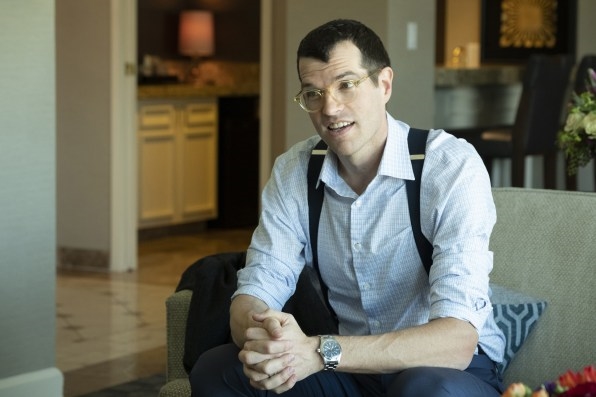“Let’s make the idiot do something dumb”: Timothy Simons on the evolution of Veep’s Jonah
He’s among the last people on earth who should be president of the United States, so obviously he doesn’t stand a chance. Right?
Well, we all remember what happened last time the common wisdom predicted as much.
This time, the longshot candidate is Jonah Ryan, a leering, terminally horny, political china-shop bull played by Timothy Simons for six seasons of HBO’s hit sitcom Veep. Jonah enters the seventh and final season, which premieres Sunday, March 31, decked out in his latest aesthetic rebranding: a wire-rim glasses-and-suspenders Man of the People makeover. The folksy vibe represents an unlikely final form for someone who started out as a wannabe D.C. insider, but Simons has made every step of Jonah’s journey as believable as it’s been weirdly hard to root against.
The actor, who is currently writing a dark comedy about assisted suicide for HBO, had Jonah’s number almost from the moment he read the pilot script.
“The first thing that jumped out at me was, more than anything else, that he thought he was better than everyone else in the room–and that included the vice president,” Simons told Fast Company over the phone recently.
In the first season of HBO’s deliciously acerbic semi-satire, Jonah Ryan is at the lowest level of the White House totem pole, a presidential errand boy. Viewers who read between the lines might even infer that the reason he fulfills this liaison role is so the White House can be rid of him as often as possible. Yet from the beginning, he talks to Vice President Selina Meyer (Julia Louis-Dreyfus) like she’s his peer–or at least he does until she cuts him down to size with incredible insults like “Jolly Green Jizzface.”
Jonah was more of a peripheral character at first. He drifted in and out of episodes, a squirt of Sriracha on scenes that had the potential for becoming bland. Over the course of the inaugural season, though, he proved to be an essential ingredient in the ensemble. Simons made the character an oafish Brundlefly of obviously unearned confidence and total obliviousness, a perfect foil for his polished sleazebag nemesis, Dan Egan (Reid Scott). He became a scene-stealer, something Simons suggests might have actually been by design.

[Photo: Colleen Hayes/HBO]
“I think I was the beneficiary of being a character where policy was not the focus, at least in the beginning anyway,” he says. “So, if the writers were ever sick of trying to come up with policy jokes, they were like, ‘Let’s make the idiot do something dumb.’”
As the writers got more of a feel for what Simons was capable of, they began to give him more screen time. Even though Veep has a history of swelling its roster’s ranks with high-grade comedic talent each year (Sam Richardson, Hugh Laurie, Diedrich Bader, Kathy Najimy, and Patton Oswalt all came on board over time), Simons seemed to steadily get bigger storylines.
Nothing in the show stays stable. Characters constantly get shuffled around. They switch sides, change careers, and, in the case of the first daughter (Sarah Sutherland), come out as queer. Even by those standards, Jonah’s path is especially circuitous. He gets fired from the White House at the top of season three, after his anonymous blog, West Wing Man, gets too good a scoop, only to make a go of blogging full-time with a new site, Ryantology. Through a typically unlikely turn of events, he ends up right back in the White House by the end of the season, a position he holds until pivoting to a congressional bid in the middle of season five.
His run at Congress in New Hampshire seems destined for failure at first. However, everything about Jonah seems destined for failure and the dude remains unflappable.
Simons partly based his character’s political tenure on Ted Cruz, who, in his words, is “this charmless, graceless man who nobody likes but has fallen ass-backwards into a position of power.” He also did some heavy shoe-leather research.
It wasn’t the first time either.
In the run-up to the first season, Simons started doing interviews with just about any politician who would give him the time of day. He had been looking to learn all the things he’d zoned out in civics class, and develop a blueprint for how to play a smug, self-satisfied White House dweller convincingly. He’d take staffers out to bars and shepherd them toward that third-drink level of dirt-dishing effluence. Once he felt he’d cracked the character, he abandoned the practice, but he picked it up again when it was time to play Jonah as an actual politician.

[Photo: Colleen Hayes/HBO]
“I focused on asking about what I personally knew would be important to Jonah,” Simons says. “When I talked to congresspeople, I would ask about the petty status things he might get worked up over. I remember, when the writers were still breaking season six, I went in with a long list of, like, ‘These are the things I found out. I don’t know if they can go anywhere but they are the kinds of things Jonah is going to give a shit about.’”
Mostly, the politicians told Simons that someone like Jonah would probably be terribly concerned being able to eat in the White House mess, having a good parking spot, and getting a congressional pin–things like that. These interviews produced at least one detail, though, that ultimately made it into the show.
“I also remember asking, ‘What would be the dumbest thing for a first-term congressperson to do, something that would alienate everyone around him?’ Most people said that everyone gets one minute on Friday to speak on the House floor, and if a freshman went in and made some big speech their first week and started banging the lectern, that would probably be bad. So, of course, one of the first things Jonah does is bang the lectern about healthy school lunches.”
Looking back now, it seems almost inevitable that Jonah Ryan would eventually run for president. His gradual failing upward from Most Hated Guy in the Office to serious political player mirrors the Sherman tank-like tenacity Donald Trump took to overcoming obstacles that should have rightly leveled any candidate. Had the 2016 election not gone the way it did while the Veep team was working on season six, it might’ve been much harder for viewers to suspend their disbelief about Ryan running for president in season seven. The show has had to adapt to the reality around it now, though, rather than the one it was born into back in 2012. And this reality, for anyone who’s been living in a protective bunker these past couple years, has been bonkers.
One thing Simons is proud of, however, is that whatever seeds of Trumpian behavior may have sprouted in the show’s characters recently were planted by the writers long before Trump ever hugged his first flag on camera.
“Jonah is guileless. He doesn’t do anything for any particular reason except that in that moment he is either upset or happy about it,” Simons says. “He doesn’t have any particular motive. Like, in the same way that people say, ‘Keep your eye on the ball, guys. Trump’s just doing this to distract you.’ No, he isn’t. He’s a senile old man whose brains are rotting and he’s shaking his fist at technology. There’s no grand plan with Jonah either. He just responds emotionally to things, and it ends up working out somehow.”
Jonah may behave horribly, but at least he’s a creature of instinct who bumbles into offenses honestly. At the dawn of Veep’s final season, there’s a debate to be had about who is actually the worse person: wildly misogynist creepazoid Jonah, or the ostensible hero of the show, Selina Meyer, who is cold, calculating, manipulative, and morally rudderless.
“I think what this season is gonna remind you is that none of these characters are good people,” Simons says. “They just tricked you into liking them for a while.”
(23)



